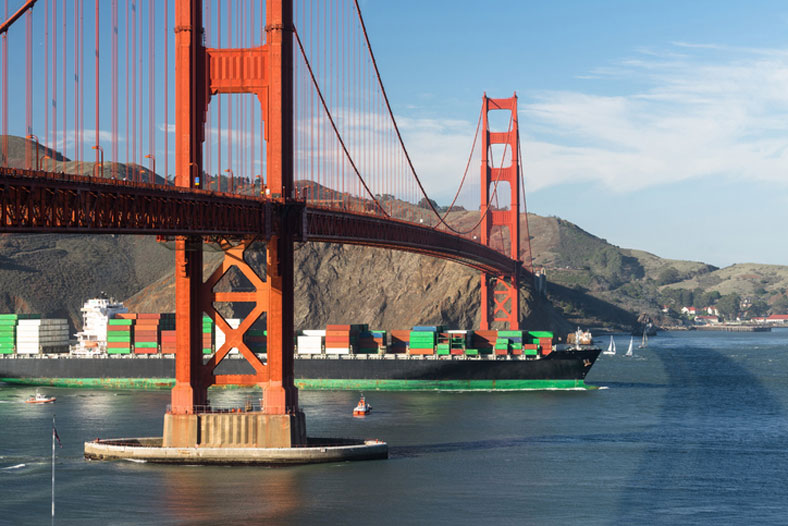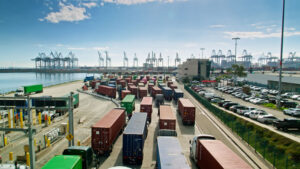
You’d be forgiven if you checked your watch a time or two while going through the long list of superlatives for California as it relates to the global supply chain.
It’s the nation’s largest economy, and among the world’s top-five. Home of leading industries. It’s the place where you’ll find the nation’s largest shipping port, along with vital and expansive highway systems, railways, and air freight shipping hubs. Headquarters for most companies on the Fortune 500 list are found here. And it’s the nation’s cultural and entertainment capital – the epicenter of America’s soft power.
And that’s just some of what you find when you take stock right now in 2023. California is also leading the rest of the nation into the future, creating the jobs and products of tomorrow. It’s not an exaggeration to say that as far as the global supply chain is concerned, in at least some sense, all roads eventually lead back to California.
With the West Coast as your home turf, you won the lottery if you’re preparing to go into logistics and supply chain management. But we all know plenty of lottery winners end up broke. You know it, and so does every company out there reliant on talented managers to keep them tied into the global supply chain. Making it in this field starts with a specialized education; a bachelor’s in supply chain management to get your foot in the door or a master’s, MBA, or post-degree certificate in SCM if you’re positioning yourself for your next big move.
Los Angeles – America’s Largest Global Shipping Port
 Half of America’s largest import partners are in Asia. China is number one, while Japan, South Korea, Taiwan, and India are all in the top-10. Vietnam is close behind.
Half of America’s largest import partners are in Asia. China is number one, while Japan, South Korea, Taiwan, and India are all in the top-10. Vietnam is close behind.
The most cost-effective shipping hierarchy starts with cargo transported by container ship, and gets increasingly more expensive as you move through rail, truck, and air. While LAX is always in the top-10 of America’s busiest airports by cargo, no other place in the nation compares to the amount of goods that pass through the Port of Los Angeles, thanks to its key location for servicing the supply chain of the Pacific Rim.
The LA Port has been variously described as the busiest port in North America and the busiest port in the Western Hemisphere. During the post-pandemic shipping boom, it was seeing 17-18 container ships per day.
Today’s container ships can carry upwards of 12,000 shipping containers, and in the near future this is expected to double. That means unloading onto 12,000 double-stacked rail cars, or 24,000 semi-trucks.
It’s hard to overstate the immensity of the Port of LA:
- 7,500 acres
- 43 miles of waterfront
- 270 berths
- 86 container cranes
- Connections to 14 major US freight hubs
- 50 container trains daily
More than 14,000 dockworkers, North America’s largest port workforce unload around a billion dollars-worth of cargo every day. While clearing a pandemic backlog in June of 2022, a new monthly record was set with 876,611 TEUs processed –the standard twenty-foot equivalent unit shipping containers.
When combined with the Port of Long Beach, these two West Coast hubs are responsible for 40% of the nation’s containerized imports. Cars, electronics, you name it.
The Port of Los Angeles is of vital strategic interest to the rest of the nation. When things go wrong here, things go wrong for America. This was most recently seen in Covid-19 supply chain shortages caused by a port backlog that had ripple effects on everything from diapers and pet food to computer chips and the inflation rate.
If you work in logistics and your supply chain involves procuring anything from Asia, the Port of Los Angeles is going to be an ever-present bright spot on your radar. Everything is bigger in America, and the Port of LA is the biggest.
What Does a Supply Chain Manager Do in California?
Tech Sector
Silicon Valley is the proud home of the world’s tech industry, one of California’s most lucrative sectors. Companies like Apple, Meta (Facebook), Intel, HP, and Alphabet (Google) are all based here. Developing a product like an iPhone takes a strong grasp of the global supply chain.
Apple’s Materials Program Manager (MPM) is responsible for developing and implementing the procurement strategy for Apple products. As an MPM you make product projections based on anticipated supply and demand. This means you must be particularly adept at accurate modeling and well versed in data analysis.
Apple prefers MPM applicants to have an MBA or master’s degree in supply chain management, engineering, or operations management. A bachelor’s degree is required.
At Google, its mid-level Program Manager in the Supply Chain Organization is responsible for duties like:
- Collaborating with different branches of the company working towards product development, like supply chain operations, finance, accounting, and engineering
- Being responsible for systems applications and products (SAP) and organizational controls
- Playing a key role in ramping up production of new products and reducing production of older technology
Google prefers applicants for its mid-level Supply Chain Program Manager to have an MBA or master’s degree with an emphasis in supply chain management or information management. A bachelor’s degree or equivalent practical experience is required.
Energy Sector
As the largest economy in the nation and one of the largest in the world, California is a major user and producer of energy. It gets 38% of its electricity from natural gas, 14% from solar power, 11% from wind, 10% from hydroelectricity and 9% from nuclear power. Most of that power comes from in-state production and generation.
San Ramon-headquartered Chevron is one of the largest oil and gas companies in the world. Its Value Chain Optimization (VCO) Global Advisor position plays an important role in operations planning and commodity supply chain management. A bachelor’s degree is a minimum requirement for this job. You also need experience with supply chain optimization and sustainable planning.
In addition to operating natural gas facilities, The AES Corporation has recently been expanding into solar, wind, and battery storage power across the state. Today it outputs 1,500 megawatts of clean energy in California with over 135 ongoing clean energy projects.
To work as a Manager of Strategic Sourcing-Wind Power with AES, you need at least an undergraduate degree in supply chain, procurement, business, or another related field, while an MBA is preferred. You also need at least five years of experience in supply chain management or a related field. Duties associated with this position include:
- Negotiating strategic supply agreements
- Cultivating relationships with renewable equipment vendors
- Maintaining efficient procurement processes
- Collaboratively defining sourcing strategies
- Maintaining documentation about contracts and bidding
Agriculture Sector
California produces over half the nation’s fruits and vegetables. Some of its most profitable agricultural products are grapes, cattle, milk, and cotton. In total over 400,000 people work in agriculture throughout the state. Caprices in global supply and demand have a notorious influence on agricultural commodities. The farm machinery and components alone that growers depend on to sow and harvest have their own intricate supply chains.
Global food leader Cargill has a strong presence in California. To work as a Supply Chain Rotational Associate involves duties like:
- Optimizing the company’s coordinated supply chain
- Implementing strategic procurement and sourcing initiatives
- Negotiating with contractors to obtain data to create a minimal level of strategic forecasting
Because Cargill cuts a wide swath in the agriculture sector, it rotates its Supply Chain Associates through niches like animal nutrition, strategic sourcing and procurement, and transportation and logistics. This helps develop internal talent for well-rounded SCM professionals.
With an eye towards developing in-house talent, Cargill stipulates that applicants for the Supply Chain Rotational Associate position should be students who are currently earning their bachelor’s or master’s degree in supply chain, procurement, or another related business field.
Ag science and technology company Syngenta sells over $3.5 billion worth of seeds globally each year and naturally has a strong presence in California. Working as a Logistics and Operations Lead with Syngenta entails:
- Implementing digital analytics for dispatch and logistics functions
- Creating distribution databases to facilitate inter-facility seed shipping
- Maintaining accurate dispatch schedules for small and midsize enterprises (SMEs)
- Ensuring logistics are efficiently managed to ensure key performance indicators (KPIs)
To qualify for this position, you need at least a BS degree in business or logistics, and work experience in logistics or a related field.
Supply Chain Management Schools – Universities in California Offering Degrees in SCM Online and On-Campus
You can get a good indication of what SCM professionals do by looking at the type of subjects covered in a bachelor’s degree in supply chain management. These programs introduce key topics like:
- Logistics and supply chain technology
- Statistics and quantitative modeling
- Supply chain analytics
- Business intelligence for supply chains and marketing
- Lean enterprising and quality management
Graduate degrees in SCM go in-depth and are also the right option if you’re a career changer with a bachelor’s degree looking to specialize in the field. Common options are a master’s in supply chain management or an MBA with a supply chain management concentration.
In terms of differences between these two options, MBA programs could be said to be more standardized, however both cover essential topics at depth and the biggest differences may come down to individual programs and professors. The bottom line is that both prepare you for success, covering:
- Advanced global operations management
- Optimization techniques and integrated logistics systems
- Supply chain data science and machine learning modeling
- Global procurement and supply management
- Supply chain disruptions and resilience
- Sales, inventory, and operations planning
You’ll refer to the principles you learn in an SCM degree program throughout your career, no matter what sector you work in.
Here you’ll find all accredited public and private universities in California offering undergraduate and graduate degrees in SCM, including on-campus and online options.
California State University Long Beach
College of Business
Accreditation: WASC
Campus (evenings)

MBA with a specialization in Supply Chain Management
Also Offers:
- BS in Business Administration with an option in Supply Chain Management
California State University Los Angeles
College of Business and Economics
Accreditation: WASC
Campus

MBA with an option in Supply Chain Management
University of San Diego
Knauss School of Business
Accreditation: WASC
Campus, hybrid-low residency

MBA with a concentration in Supply Chain Management
MS in Supply Chain Management
- General concentration
- Healthcare concentration
Also Offers:
- Option for dual MBA degree with a JD or MS in Business Analytics
University of Southern California
Gordon S. Marshall School of Business
Accreditation: WASC
Campus, online

MS in Global Supply Chain Management
Also Offers:
- Graduate Certificate in Optimization and Supply Chain Management







